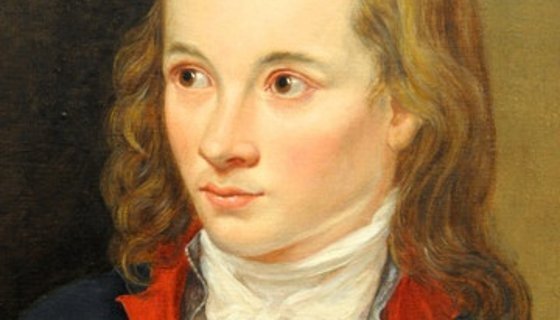In 2020 we celebrate -coinciding with the beginning of the pandemic- the 250th anniversary of the birth of three German geniuses: Beethoven, Hölderlin and Hegel. That year I was able to read the excellent biography of the German romantic poet Novalis, a contemporary of the above, written by Antonio Pau. It was not and is not his birthday, but it seems to me that his life and work can be tremendously luminous these days. For as he once wrote: the poet understands nature better than the scientist.
In this strange situation that we are still dragging along in which we receive so much news about deaths, hospital admissions, daily heroes, lights and meanness, loneliness and solidarity, it seems inevitable - as has already been rightly said by some - to realize what is really valuable in our lives, and I think that this is precisely what the great German artist can help us with.
Everything about Friedrich von Hardenberg, who was called Novalis before he chose his famous pseudonym, is brief in his fruitful life. Just twenty-eight years on earth, a minuscule geography - he only moved through a few villages in Saxony - a few friends, a few pages. And yet his life was a constant search for the absolute.
Exercise slowness, he wrote in one of the notebooks he always had at hand. He felt almost from childhood the imminence of death and precisely for that reason he had to write slowly. There would be no time for revision. Everything is seed, he also wrote, in another place, in another notebook. A seed that he knew well that he would not see germinate.
He searched for the absolute that every man intuits among the ephemeral that surrounds him. We search everywhere for the absolute -he wrote- and we always and only find things. But the fact that he only found things did not discourage him. What he did was to delve into them, and he did so by two seemingly contradictory paths: the study of things through science and the search for their mystery through poetry.
The events we have lived and are living through with intensity, which bring us the experience of pain together with the clear insufficiency of a fragile material well-being to attain happiness, can be propitious for reflection. Faced with the loneliness of the sick who have been forced to fight for their lives with the help of so many heroic doctors and nurses, there is no choice but to try to delve into the spiritual dimension of our lives.
Novalis was a good man, of a kindness that was at once childlike and mature. His life and his work are impregnated with that gaze of kindness -recious and wholehearted, not soft or tearful- with which he contemplated everything. The romantic is usually assimilated to a childish candor, to a vaporous and vague reverie. And our poet was rigorous and precise. That is why he wrote: Scientific accuracy is what is absolutely poetic.
The life and work, both truncated, of the great poet, have remained like those Greek torsos that time has mutilated with such beauty. Goethe lived eighty-two years in perfect health and left an impeccable work. Novalis lived twenty-eight, a great part of it ill, and has left only unconnected fragments, unfinished novels and a handful of poems. It seems as if his life and his work had to have been like this, suffering and mutilated, to reach the perfection that corresponded to them.
In that short life he left two imperishable works: Christianity or Europe and the Hymns to the night. In the first essay, written in 1799 while the cries of the French Revolution and Napoleon's cannon fire and the collision between religious fervor and anti-religious enthusiasm resounded, Novalis adopts a radical stance for those times.
The young poet, as a good romantic, is nostalgic, if one can call it that, for a more spiritual and harmonious future time. The romantic is uncomfortable in the days he has had to live. He feels stateless and bets that the present difficulties will serve as the birth of a better future time: the time of the reconciliation of Europeans, the time of a new unity of Europe founded on eminently spiritual ties.
For their part, the Hymns to the Nightare, at the same time, the story of an intimate experience and a cosmogony. The premature death at the age of 15 of his fiancée, Sophie von Kühn, paradoxically leads him to exalt the world - of worlds, better, the visible and the invisible -, the great realities - light, night, infinite spaces, time, earth, nature, man, death, joy - and God.
It is striking that a man who suffered so much during his short life writes with an enthusiasm that, at a distance of more than two centuries, is still moving. The same man who wrote that every man has his years of martyrdom, also said that through prayer everything is achieved. Prayer is a universal medicine and that God must be sought among men. It is in human events and in human thoughts and feelings that the spirit of heaven is most clearly revealed.
I recommend reading this wonderful biography of Novalis while so many people suffer in silence, some in the solitude of their illness and others trying to fight the physical and psychological virus of living in permanent fear. These are hard times, as Saint Teresa of Avila used to say, but among so many difficulties, the goodness of so many people shines brightly and can emerge transfigured from this journey we share. And that is why I wanted to share it with you.





 The beatification of Queen Elizabeth
The beatification of Queen Elizabeth





